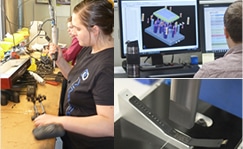Materials & Material Selection
PILLER AIMMCO successfully processes and injection molds a wide range of thermoplastic resins, including highly engineered custom compounded materials for high temperature / high stress applications with fillers such as long glass fiber, carbon fibers, metal fibers, inorganic compounds and high specific gravity additives such as barium sulfides and tungsten. Structural foaming agents are also used when required to reduce the material needed for large thick-walled parts while enhancing stiffness and strength.
Recycled Plastic
We produce over 20 million parts a year that use over 10 million pounds of recycled plastic in polypropylene, HIPS, ABS, GF Nylon and high density polyethylene’s. Most recycled material is ran thru our custom on-site blending of recycled feed stocks with various property-enhancing polymers, resulting in the appropriate strength, toughness, and appearance for our customers.
Material Selection
With the myriad of thermoplastic resins available, selecting a suitable material can be a daunting task, so it is always advantageous to collaborate with material, tooling & molding engineers to identify and evaluate options. By focusing on the answers to a few application questions, choices can be narrowed and tested to ensure the part design and material selections are suitable.
Application requirements can generally be broken-down into the following six categories:
- Toughness
- Rigidity
- Appearance
- Environment
- Regulatory
- Cost
Toughness
Notched Izod, Unnotched Izod, Charpy, Ball Impact, Tensile Strength, Shore Hardness and Flexural Modulus are all physical properties to consider when accessing the toughness of a particular resin. When comparing numbers, bear in mind that the ASTM and ISO tests standards referenced on a material Data Sheets are lab tests done in a controlled environment which might not accurately reflect relevance to a particular application, so use these figures as guides and comparatives, while being mindful that published test criteria can be different across resin grades.
Rigidity
Material Stiffness is influenced by physical properties like Flexural Modulus, Tensile Strength and Shore Hardness, but it is important to understand that Toughness and Rigidity are interrelated. Achieving higher stiffness and rigidity usually comes with a corresponding reduction in impact resistance and more brittleness.
Temperature must also be considered with respect to the Rigidity demands of the application. ASTM and ISO tests for Heat Deflection are good indications of how a material will perform at elevated temperatures, while cold temperatures can greatly reduce Toughness. If cold temperature Toughness is critical to the application, oftentimes one must accept a little less stiffness at ambient temperature in order to maintain adequate toughness at the cold temperature extreme.
Appearance
Although not always the case, cosmetics are oftentimes a primary factor in material selections, and the as-molded appearance of thermoplastics vary widely. Special effects and properties such as translucency, IR transparency, opacity, reflectivity, conductivity and static dissipative properties are often considerations. Aside from the as-molded Appearance of a particular material, secondary processes will also affect the final cosmetics, so consideration will need to be given to any secondary processes envisioned such as:
- Painting
- Plating
- In mold decorating
- Pad printing
- Silk screening
- Laser marking
- Pre-coloring
- Joining (heat staking, ultrasonic welding, bonding, etc.)
Cost
The cost of thermoplastic resins can range from less than $1 per pound for commodity & reclaimed grades of polypropylene and HDPE’s, to more than $100 per pound for exotic highly engineered resins. However, there are additional factors to the cost equation beyond the actual price of the material which will impact the finished part price. These factors include:
- Molding cycle times
- Type of machine required and the associated machine rate
- Reject rates
- Pre-production processing such as drying times & color change overs
- Allowed regrind percentages
- Assembly costs and finishing costs
For these reasons, it is beneficial to consult with molding, tooling and material experts to gain a complete understanding of the cost equation for a particular resin choice.
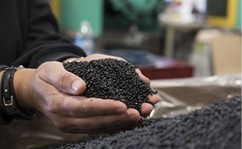
Thermoplastic Injection Molding Resin
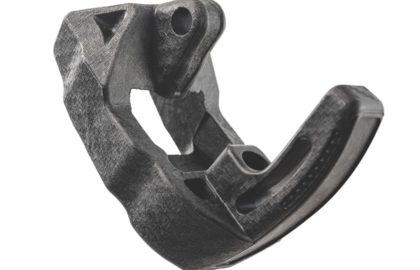
Long Carbon Fiber Filled Nylon–Metal Replacement Part
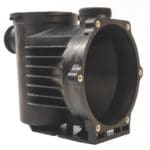
Talc Filled Polypropylene Industrial Pump Housing
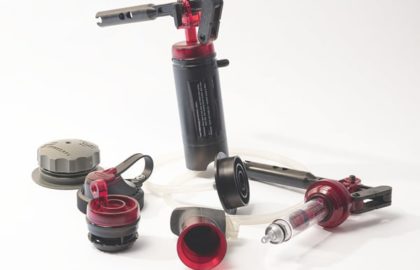
NSF Certified Potable Water Moldings
Environment
Considering all aspects of the environment the product will be used in is arguably the most important factor in material selection. Chemical exposure, temperatures, pressures, ultra violet radiation, cleaning and sterilization methods, contact with food, bodily fluids, potable water or skin, and whether under the hood of car, in the cabin of an airliner, or in the garage or locker room, all of these environments present a set of conditions that should be thoroughly considered to ensure compatibility.
Regulatory
The need to meet federal and international regulations are commonplace for injection molded parts and assemblies. Some of the more common regulations include:
- UL
- CE
- USP
- FDA
- FAA
- Military Specifications
- Drug Master File
- NSF
- ISO
- RoHS
- REACH
In most instances, thermoplastic resins are available with documentation to meet these requirements from the manufacturer or compounder. However, in certain cases additional third party testing and certification might be required, so it is important to understand all regulations surrounding the end product and determine what regulations, if any, apply to the molded plastic components and assemblies.
